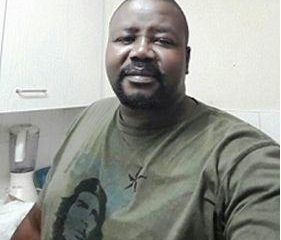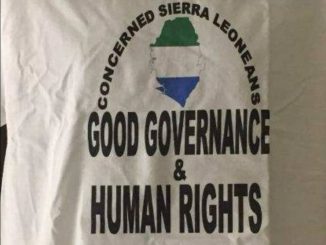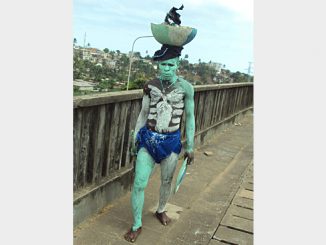
President Bio came to power in 2018, and made the fight against corruption, among others his signature vison and policy. But he wisely reminded us all, that the fight will not be easy or go unchallenged. He famously said that “Corruption will fight corruption”. But in fighting corruption, the fundamental values should be integrity and transparency. Corruption is the mortal enemy of democracies, and especially young democracies like ours in Sierra Leone. But just like charity, corruption starts at home. We should all see and treat corruption as the disease, and single most cause of our societal ailments.
The vaccine therefore is transparency, an essential part of its treatment. It goes without saying that those who fight corruption must be “clean” themselves. Integrity is premium.
Therefore, President Bio’s legacy might be judged largely by his level of success in his fight against corruption. He wants us to move from a culture of corruption to one of reforms. To do this, our government needs to be serious about it and give the public the government we deserve. Irrespective of your political persuasion, you cannot ignore or deny the fact that President Bio’s government has made laudable progress in many spheres. Even when trapped by the catalogue of difficulties, including high cost of living, unemployment, deprivation, inflation and all sorts, our progress as a country would be difficult to achieve outside democratic principles.
Many recognise the strident steps taken by President Bio in dumbing down the draconian Libel Act, the abolition of the death penalty and most recently, allowing Sierra Leonean citizens in the diaspora, to participate in the public political life blood of our society, to name but a few. You cannot deny that these have been tangible steps to strengthen our nascent democracy. But recent events in parliament have seen the NGC, APC and other opposition parties walk out mid-session, in defiance of Bio’ political appointment of Zainab Moseray as NEC Commissioner for the Western Region.

According to the NGC Party, “Our rejection of this appointment is due principally to her very controversial and unsatisfactory track record in her previous employment as Acting Registrar at the PPRC.” The NGC finds it unethical to consider Zainab Moseray “for such high office when the position she currently holds is yet to be cleared of wrongdoing (corruption allegations) as a result of findings by the audit service and the ACC.” (thesierraleonetelegraph.com– October 26, 2021).
This is coming hot on the heels of the recently concluded bye elections in Koinadugu District, for which the main Opposition APC party has launched a legal action against the electoral body NEC. According to the APC, “The inaccurate entry was in respect of the total number of votes cast in favour of KALIE THORONKA (“SLPP”). Instead of entering 049, as recorded in the RRF Form, 149 was purportedly entered intentionally, to give numerical advantage to the said KALIE THORONKA (“SLPP”), thereby resulting in an extra 100 votes in his favour” (sierraleonetelegragh.com-October27, 2021).
After President Bio won the elections, which was popularly acclaimed as free and fair by a narrow margin of about 3 percentage points, the EU mission made 29 recommendations; as part of its commitment to strengthen “electoral management by providing experts, logistics assistance and elections monitoring”. Norbert Neuser – a Member of the European Parliament and the EU Election Follow-up Mission and his team, held discussions with former President Koroma – the outgoing Chairman and Leader of the main opposition All Peoples Congress (APC), at his residence in Freetown on Tuesday. The Mission’s Team Lead Dominic Howell noted that “improving on gender representation in elective positions, the management of elections particularly on the tallying and computation process and the general transparency of elections,” were paramount to their objectives. The EU Commissioner and British Ambassador also visited the former President Koroma for undisclosed discussions.
So, with the opposition APC party launching a legal action against the National Electoral Commission with allegations of vote rigging in the Koinadugu bye elections, would this make for a good bedtime story for President Bio? Is this just a coincidence that our European partners, who take special interest in “the tallying and computation process and the general transparency of elections”; in support of strengthening our democratic process are holding discussions with the main opposition party? Is the timing coincidentally ironical or ironically coincidental? If part of the mission’s objectives is to help ensure, monitor and maintain the integrity of our electoral process and hence our democracy, are these visits suggestive of something we do or don’t know?
In view of the contextual backdrop of these visits, should Sierra Leoneans be concerned about our electoral integrity as a nation under President Bio’s government? Is the rejection of the appointment of Zainab Moseray as NEC Commissioner for the Western Region, and the resulting walkout of the opposition parties a sign of the times? Does the APC’s allegation, I repeat allegation of vote rigging in the bye election suggest a sort of advance auction sale of stolen goods? Are these recent events meant to highlight doubts on the political and in effect democratic credentials of the SLPP? If so, is President Bio in danger of blotting the otherwise laudable reforms he had undertaken?
Is President Maada Bio in danger of destroying his legacy of strengthening our democracy?
President Bio may have done a lot in reforming some of our political gridlocks. But all that may pale into insignificance if our political, and specifically our electoral system is dogged and littered by doubts and integrity vacuums. The oppositions believe that Zainab Moseray carries too much baggage to merit their trust in her integrity. Do those who reject Zainab’s appointment see it as unethical and untransparent to rubber stamp her proposed role? Do they see it as hypocritically audacious to preach integrity from a den of corruption?
The National Electoral Commission is one the most important custodians of our electoral process, a major beacon of our democracy. Such an important institution should be beyond reproach and be able to stand the test of any level of scrutiny. When the credibility of its members is brought into question, it runs the risk of losing the trust and confidence of the public. How can you trust the message if you don’t trust the messenger? But we have been told to trust the process, remember?
Integrity and transparency are essential contributors to democracy. When fighting corruption becomes a priority, honesty, integrity, transparency and the blunt refusal to be compromised should be the building blocks for a balanced success. Sadly, our opposition parties resorted to walking out of parliament, in protest of the NEC appointment. We must recall that the SLPP perfected this art while in opposition. But where did it get them? If anything, it unintentionally gave the then President Ernest Koroma carte blanche to bastardise the constitution. Would that be the same if the opposition parties follow the same route, instead of engaging the ruling party? May be, just maybe it’s not the best course of action; to throw the baby out of the pram. Remember that those who are too smart to engage in politics are punished by being governed by those who are dumber – Plato
While the allegations, innuendos, rumours and political gymnastics continue, there is a need for a strong moral authority to protect and maintain our young democracy. A free, fair and peaceful election day is not enough proof of democracy. It is a process and the fundamentals of it. Our local and general elections are the best opportunities to showcase our political maturity as a nation. To achieve this, we need to ensure that the institutions and processes are beyond reproach and have the confidence and trust of our people. There can be no faith in government if our highest offices are excused from scrutiny.
Don’t Forget to turn the lights off when you leave the room.
Abdulai Mansaray.



